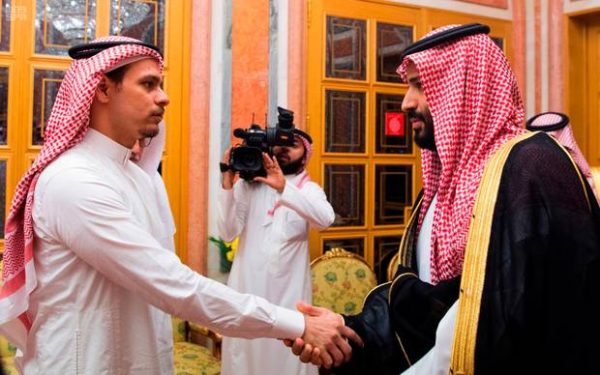
In President Recep Tayyip Erdogan’s speech last night about the killing of Saudi journalist Jamal Khashoggi, there was a glaring omission: The name of Saudi Crown Prince Mohammed bin Salman.
Mohammed is widely seen as Saudi Arabia’s de-facto ruler, and since Khashoggi vanished, questions have swirled about whether any Saudi operation to capture or kill him could have been ordered without Mohammed’s approval.
But Erdogan addressed his comments – his appeals for justice, his demands for answers – not to Mohammed, but to his father, King Salman.
If it was a conspicuous display of respect for the Saudi monarch, it was also an attempt to drive a wedge between the king and the crown prince, whom Erdogan considers a rival and ideological opponent, as well as a threat to Turkey’s interests and ambitions in the Middle East, analysts said.
There was debate about whether Erdogan aimed to marginalise Mohammed or prod Salman to pick a new successor, but in either case, he was trying not to damage Turkey’s overall relationship with Saudi Arabia, they said.
Oh yes. I never bought into this as Turkey going for the kill against Saudi Arabia or even MbS. Turkey is walking a fine line between milking a situation that’s making it look good, and not jeopardizing ties with Riyadh. Simple as that. The truth & justice are secondary. https://t.co/HonA95o9Jp
— Hassan Hassan (@hxhassan) October 24, 2018
And it was the latest sign of Erdogan’s willingness to use Khashoggi’s case – prolong it even – to serve his larger strategic goals.
More than three weeks after Khashoggi was killed by Saudis in what Erdogan called a “planned” operation, his Government has yet to publicly divulge all that it knows about the plot or who ordered it.
Saudi Arabia denied any knowledge of Khashoggi’s whereabouts for weeks but acknowledged in the last few days that he had been killed in what they said was a fist fight with “rogue” Saudi operatives.
Turkish investigators said they had pieced together much of the Saudi plan within days of Khashoggi’s killing. But their strategy has been to leak details bit by bit, pressuring the Saudis to reveal what happened and perhaps wringing concessions from Riyadh and its allies.
Erdogan’s speech continued that pattern, providing intriguing new details but failing to deliver the “naked truth” that he had promised and that had generated global interest in what he had to say.
He may have had a much smaller audience in mind.
The speech contained a “direct message” to the king, said H.A. Hellyer, a senior non-resident fellow at the Atlantic Council think-tank, noting the deferential references to Salman in Erdogan’s comments.
Even Erdogan’s most difficult request – that the Saudis extradite to Turkey 18 suspects arrested in the plot – was framed as a “proposal” to the king.
“He’s hoping that by going about this in sort of delicate fashion that the king himself will decide that Mohammed bin Salman ought not to be crown prince,” Hellyer said.
The odds of that outcome appear low, Saudi watchers say, but Erdogan’s pursuit of it illustrates the depth of his antipathy towards Mohammed and his policies in the Middle East.
The issues dividing the two countries include Turkey’s support for Qatar, which is locked in a bitter feud with Saudi Arabia and its closest allies, the United Arab Emirates and Egypt.
Turkey has also supported Islamist movements like the Muslim Brotherhood that those states have outlawed.
And Erdogan resents the Trump Administration’s strong reliance on the Saudis, their Arab allies and Israel as key players in the US effort to counter Iran, said Aydin Selcen, a Turkish political commentator and former diplomat.
“They all see Iran as a priority in their security. In Turkey’s case, it is not so. Turkey has other priorities,” he said.
Hellyer said Ankara sees Mohammed and the leaders of the UAE and Egypt “as the three most significant people disrupting or opposing the growth of Turkish hegemony.”
If Erdogan “can get Mohammed bin Salman dislodged or marginalised, by the nature of gravity, the positions of the other two are weakened,” Hellyer said.
The strategy carries considerable risks for Erdogan, given Mohammed’s youth and the possibility that he could sit on the Saudi throne for decades, nursing a grudge against Turkey.
Erdogan “would like the son to go,” said Soli Ozel, a professor of international relations at Kadir Has University in Istanbul. “He’s trying to do this without breaking any eggshells.”
Turkey is possibly seeking other benefits, too, including financial aid from the United States or Saudi Arabia.
Ankara, the world’s leading jailer of journalists, would also like to ease the international isolation it faces because of its own human rights record.
And then there’s the matter of national pride.
The Saudi decision to pursue Khashoggi in Istanbul “is a slap in the face of this Government,” Selcen said. “For me, as a Turkish citizen, it’s a slap in the face. This needs to be settled, between King Salman and Mr Erdogan.”
The Turkish Government has won praise so far for highlighting Khashoggi’s plight but risks being accused of pursuing its own interests over justice for the journalist as the crisis drags on, analysts said.
“Maybe they overdo the drip-drip strategy,” Selcen said. “They may lose the moral high ground.”
NZ HERALD

Leave a Reply
You must be logged in to post a comment.